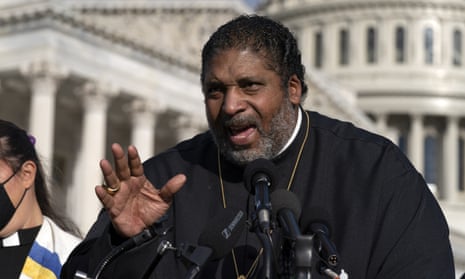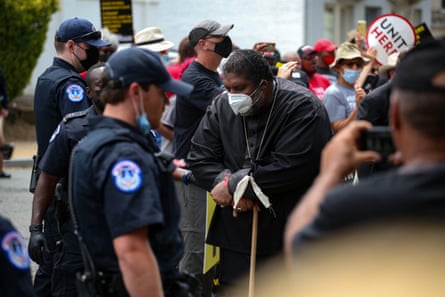From church to classroom: the Rev William Barber takes his ‘moral mission’ to Yale
"The leader of the Poor People’s Campaign will train the next generation of ‘moral fusion leaders’ at the Yale divinity school

On Tuesday, 17 January, the Rev Dr William Barber will trade in his purple pastor’s smock and clerical collar, step away from the Greenleaf Christian church in Goldsboro, North Carolina, where he has preached for 30 years, and enter a Yale classroom where he will embark on his new mission: training the next generation of what he calls “moral fusion leaders”.
For Barber, the exchange of pulpit for white board will not be unduly fazing. As one of the US’s most prominent civil rights leaders he has been effectively teaching the nation about social justice for years, albeit on the raucous frontlines of public activism rather than in the hushed calm of an Ivy League institution.
Exactly 10 years ago he was propelled on to the national stage when he spawned a series of weekly civil disobedience protests in North Carolina against the Republicans’ extreme voter suppression bills and benefits cuts. Within a year, the “Moral Mondays” snowballed from 50 people to more than 100,000, generating a nationwide movement called the Poor People’s Campaign, a conscious echo of the movement of the same name that Martin Luther King Jr led and which was cut short when he was gunned down in 1968.
And now a new chapter opens in the seemingly irrepressible rise of this dynamic preacher: the Center for Public Theology and Public Policy at the divinity school of Yale University, which he will direct and where he will teach as a “professor of the practice”. Barber has big ambitions for the center, which will surprise no one who has followed the path of a man who has always set gargantuan goals for himself: eradicating American poverty, ending environmental destruction, combating racism and putting moral purpose back at the center of public life.
The idea behind the Yale center, he told the Guardian in an interview, was to dig down to “our deepest moral values, both in the scriptures and in the constitution”.
Barber has always operated at the intersection of ideas and action, and his new center will be no exception. He hopes to set his Yale students on a path toward public service, armed with an unshakeable sense of why they are doing it.
“We’re going to work with students who want not just to have a career, but to make a difference. We want to show them what that difference might look like, if they choose to live out their lives in some way guided by the deepest moral principles,” he said.
Scholars drawn from economics, history, social policy, health and civil rights law, as well as Biblicists and theologians, will all be thrown into the mix. An outpost of the program in the US south, based at an as-yet-unannounced historically Black college or university, will be added in time.
Barber has a long list of attention-grabbing actions that have brought him to this point. He received a standing ovation for his speech to the 2016 Democratic National Convention, grilled Democratic presidential candidates in 2019 on what they would do to tackle inequality, and has been arrested countless times in protests over voting rights and ending the US Senate filibuster.
His fight for environmental justice led him to partner with the Guardian in cancer alley, an area of Louisiana poisoned by industrial pollution and suffering devastating rates of sickness as a result.

In a sense, the new Yale center will be a culmination of all that. It will pull together all that Barber has learned from decades on the frontlines and inculcate it into the hearts and minds of young leaders.
It is Barber passing the baton.
“I don’t believe leaders should just lead, lead, lead and then die and leave all of it in their head, or get despondent and not want to teach because they’re so frustrated, or get killed,” Barber said in his trademark vivid language. “Let’s be honest, many of our moral leaders have been killed. I don’t believe Moses has to die for Joshua to rise – you know, that’s a bad model.”
The reference to murdered moral leaders is pertinent on Martin Luther King Day. To say that Barber has reflected long and hard on King would be an understatement.
While King informs much of his thinking and activism, Barber is unsettled by the way that the great slain civil rights leader is often remembered. He fears the US is encasing King in aspic, stopping his legacy at 1968 and silencing his call for change.
“America loves its prophets, but prophets who cannot trouble us any more,” Barber said. “This weekend, when we talk about Martin Luther King, we can’t just celebrate what he did. This is not a commemoration, it’s a recommitment.”
Barber grew animated, his oratory soaring, which is another of his hallmarks. “It often saddens me when I go to King events, how many people want to have a commemoration, not a re-engagement. I mean, Martin didn’t leave us, he was murdered, assassinated.
“He was telling us when he died that the greatest fear of the southern aristocracy was the coming together of the poor masses, Black and white. Far too many people never heard that, so they stop at the March on Washington.”
He continued: “It’s like turning civil rights into a museum. We don’t need museums, we need a movement. The only way you honor your prophets is when they fall, you pick up the baton and walk the next mile.”
As the new year begins, Barber is preparing to walk that next mile. Though he has given up his pastorship in Goldsboro, he will continue to lead the Poor People’s Campaign alongside co-chair Liz Theoharis; we can expect to see much more of him in 2023 fronting protest marches and being carted off in handcuffs by police.
What does he think will be the main civil rights challenges in the year ahead? He begins his answer by noting that many of the reforms that King called for in the 1963 March on Washington remain bitterly unresolved to this day.
“Living wages was an agenda item at the march, healthcare was an agenda item, fully protecting voter rights was an item. Today we still don’t have a living wage, we still don’t have healthcare for all, and we’re seeing rampant voter suppression. These things need to be matters of deep dissatisfaction,” he said.
Barber also had strong words for the two main political parties in the new year.
“On the one hand, you got the extremists who call themselves Republicans who want to tear down everything, go backward, block women’s rights, destroy voting rights, they treat people like things and corporations like people. On the other hand, you got Democrats who have done some good things like the American Rescue Plan but want to celebrate those few things as though the job is completed and there’s nothing much left to do. My message to Democrats is: don’t rest on your laurels, don’t just say ‘We did this’ – there are 140 million poor people in America today.”
Listening to Barber can sometimes feel overwhelming. The scale of the challenge that he is calling on us all to confront is so large, the climb so steep to get to that mountaintop.
But he appears utterly undaunted. He has his “rough days”, he confesses, when frustration does get to him. “But I’m not pessimistic,” he said.
“I’m hopeful because of what I see in people. When I go among poor white folk in West Virginia who say, ‘Reverend Barber, we are not going to be silent any more.’ Or I go among poor white farmers in Kentucky saying the same thing: ‘We’re not going to be silent any more.’ Or Black women down in Alabama, or fast-food workers in North Carolina. All of that, all those people, they give me hope.”
No comments:
Post a Comment